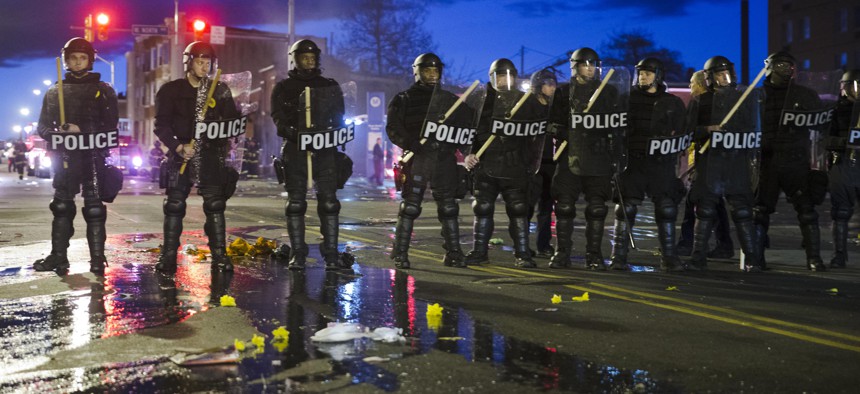After Riot Cleanup, Baltimore May Face Big Long-Term Economic Repercussions

Police stand guard Monday, April 27, 2015, after rioters plunged part of Baltimore into chaos, torching a pharmacy, setting police cars ablaze and throwing bricks at officers. Matt Rourke / AP Photo
A study of the 1992 L.A. riots showed $3.8 billion in lost taxable sales over 10 years.
As parts of her city were descending into violence, looting and arson on Monday evening, Baltimore Mayor Stephanie Rawlings-Blake said: “Too many people have invested in building up this city to allow thugs to tear it down.”
But long after the broken glass is swept up and burned-out businesses are rebuilt, the economic damage might be long lasting no matter how much positive energy the mayor and civic stakeholders invest in moving Maryland’s largest city past this unfortunate chapter in its history.
As the Baltimore Business Journal reported Tuesday, a 2004 study of the impacts of the 1992 Los Angeles riots showed $3.8 billion in lost taxable sales over 10 years. While it might be unfair to compare the L.A. riots to the recent unrest in Baltimore, that situation might point to some of the challenges Charm City could face in the years to come.
According to the Business Journal:
Victor A. Matheson, co-author of the study, said he found that the economic impact of riots is even larger than that of natural disasters, because businesses are more likely to see natural disasters as a one-time occurrence as opposed to an ongoing safety issue.
And plenty of people were watching the violence on live television around the world and might have concerns about ongoing safety in Baltimore. As television and media critic David Zurawik wrote in The Sun:
Television was filled with images of Baltimore burning Monday night. And those pictures that were seen nationally and globally have been seared into the minds of at least another full generation of viewers.
And what was seen on Monday night might overshadow the many years of efforts civic and business leaders have made to make Baltimore into a popular tourist and sports destination, convention site and place to do business.
This winter, Route Fifty profiled Albuquerque’s efforts to promote an ambitious innovation and economic development agenda in the midst of negative national media attention on the problems facing its police department, which was the subject of a federal investigation and intense local protests over its law enforcement practices.
New Mexico businessman Doug Turner, a 2010 Republican candidate for governor, said in an interview:
“Optics and perceptions matter. There’s a national narrative out there. Does it impact perception? Absolutely! The impact on economic development is potentially very real. What are the perceptions of law enforcement, of crime in the city, of the city’s leadership and accountability? People need to perceive that positive change is taking place.”
And on Tuesday, as Baltimore’s mayor continued to face criticism for her response to the unrest, Rawlings-Blake was the city’s No. 1 cheerleader. In a tweet: “I sincerely want to thank all those out there cleaning up streets and sharing their love for #OurCity. Thank you, Baltimore!”
Positive, forward-looking tweets, of course, only do so much good. The mayor’s administration has a lot of work to do to repair the city’s image as serious questions remain over the conduct of Baltimore’s police and the department’s fractured relations with the residents they serve.
NEXT STORY: Implementing New Technology in State Government Can Create Big Headaches






